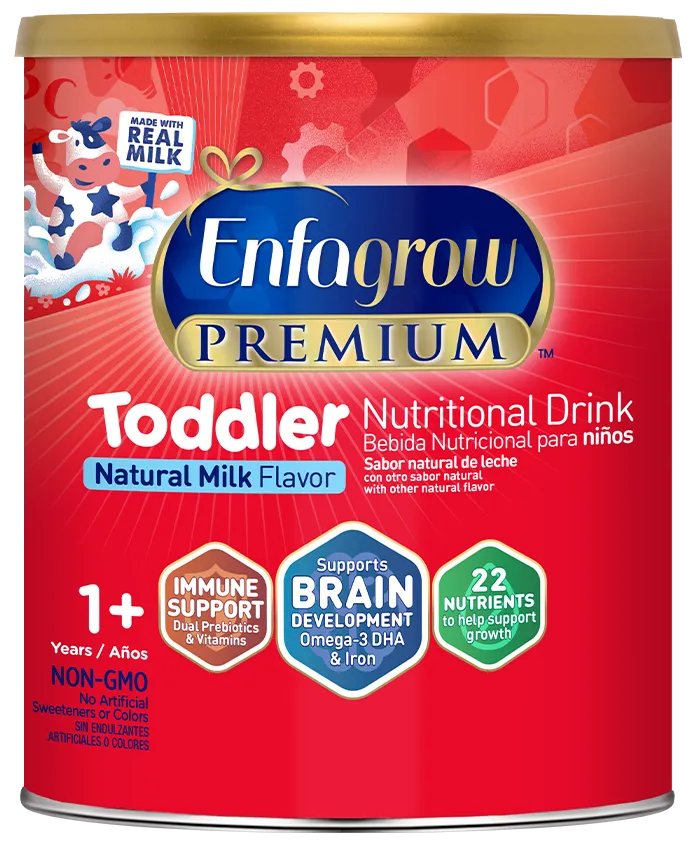Due to maintenance, rewards points for receipt uploads will be delayed. Thank you for your patience!

Learn about Enfagrow® Premium Toddler Nutritional Drink’s nutritional components compared to cow’s milk.
3 Minute Read
While milk is a traditional staple in a toddler's diet, Enfagrow® Premium Toddler Nutritional Drink offers a blend of nutrients designed to support your toddler’s growth, immune system, and development in two delicious flavors. In this article, we'll explore the differences between Enfagrow® Premium Toddler Nutritional Drink and cow’s milk to help parents make informed decisions about their child's nutrition.

|
DHA Source tuna fish oil
Helps support brain development |
|
Iron building block of the brain
Provides oxygen to body tissues and muscles |
|
Prebiotic galactooligosaccharides, polydextrose
Helps support digestive health and the immune system |
|
Vitamins niacinamide, ascorbic acid,calcium, pantothenate,vitamin B6 hydrochloride,thiamin hydrochloride, vitamin D3, riboflavin, folic acid, biotin, ascorbyl palmitate, vitamin E acetate, vitamin A palmitate
Important for growth and development |
|
Protein nonfat milk
Building blocks of cells |
|
Minerals calcium carbonate, magnesium phosphate, salt, ferrous sulfate, zinc sulfate, manganese sulfate, cupric sulfate
Important for growth and development |
|
Carbohydrates lactose from nonfat milk, corn syrup solids
Provide energy for the brain and body |
|
Fat Source vegetable oil
Provides energy for growth and cell functions |
Cow's milk is nutritious and can be an important part of your child's diet. Yet during the toddler stage, while the brain is still growing rapidly, many parents prefer giving their children a drink that has a brain-building nutrient like DHA which is naturally found in fish and seaweed. Although cow's milk has important nutrients, it doesn't have DHA, and while there are DHA-fortified cow's milk options, nutritional drinks like Enfagrow have other relevant and important nutrients to support their development, such as prebiotics and iron.
|
Nutrient |
Enfagrow® Premium Toddler Nutritional Drink (1/3 cup powder) |
Cow's Milk (per 1 cup)* |
| DHA | 26 mg | 0 |
| Dietary Fiber | 1 g | 0 g |
| Protein | 6 g | 8 g |
| Vitamin A | 50% | 8% |
| Vitamin C | 70% | 2% |
| Vitamin D | 25% | 25% |
| Vitamin E | 20% | 0% |
| Thiamin (B1) | 60% | 2% |
| Riboflavin (B2) | 70% | 30% |
| Vitamin B6 | 70% | 4% |
| Niacin | 80% | 0% |
| Folic Acid (Folate) | 60% | 0% |
| Pantothenic Acid | 60% | 0% |
| Biotin | 380% | 0% |
| Phosphorus | 40% | 20% |
| Magnesium | 50% | 6% |
| Iron | 35% | 0% |
| Zinc | 90% | 0% |
| Copper | 100% | 2% |
| Potassium | 10% | 5% |
| Sodium | 5% | 4% |
| Calcium | 35% | 30% |
*Approximate based on USDA data for Milk, fluid, 1% fat, without added vitamin A and vitamin D
Enfagrow is tailored for toddlers aged 1 to 3, focusing on key nutrients like DHA, prebiotics, and iron crucial for their growth and development, often used as a supplement to the daily diet. PediaSure, designed for children aged 2 to 13, offers a broader range of nutrients and serves as a nutritional supplement or meal replacement for those with increased nutritional needs or selective eating habits.
| Feature | Enfagrow | PediaSure® |
| Target Age Group | Toddlers aged 1 to 3 years old | Children aged 2 to 13 years old |
| Usage | Supplement to toddler's diet to support adequate growth | Nutritional supplement or meal replacement for increased nutritional needs |
*PediaSure is a registered trademark of an entity unrelated to Mead Johnson & Company, LLC.
Once your child reaches one year of age, we like to offer nutritious options that make a welcome addition to their diet to help close any gaps in their nutritional needs. Both of our Enfagrow Nutritional drink options have DHA, which is a key brain-nourishing nutrient that’s great for children to have at all stages of life, and especially during toddlerhood, a time of rapid brain growth.
Enfagrow Premium Toddler Nutritional Drink is for toddlers one year and up. It has:
Enfagrow Premium Gentlease® Toddler Nutritional Drink is designed to help ease & soothe tummy discomfort. It has:
Enfamil Family Beginnings® is a program designed to help you navigate the fun and the fuss of parenthood. Get expert tips, explore toddler development resources, and connect with other parents for advice. Plus, enjoy exclusive offers on all sorts of Enfamil® products, including chances to win fabulous prizes in our monthly sweepstakes. We look forward to welcoming you to our family!
All information on Enfamil, including but not limited to information about health, medical conditions, and nutrition, is intended for your general knowledge and is not a substitute for a healthcare professional's medical identification, advice, or management for specific medical conditions. You should seek medical care and consult your doctor or pediatrician for any specific health or nutrition issues. Never disregard professional medical advice or delay seeking medical treatment, care, or help because of information you have read on Enfamil.